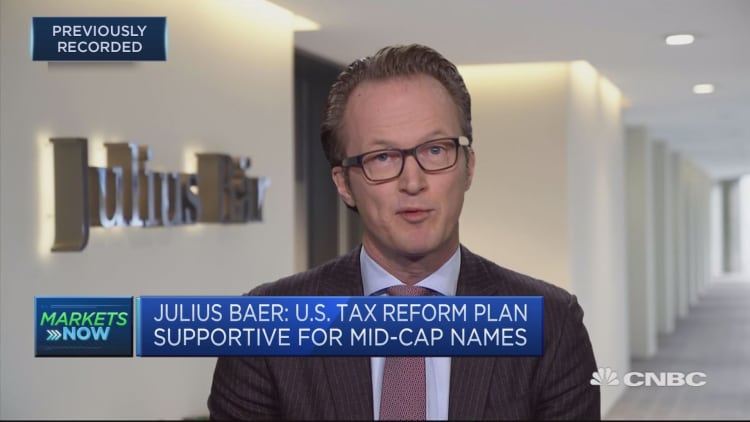The emboldened retail investor may be a new catalyst to help take stocks higher — for now.
By any number of measures, the stock market looks to be in great shape — a big healthy bull driven by solid earnings, a growing global economy and the promise of a big tax cut. But strategists also warn the rally, more than 8 1/2 years old, is in the latter stages of the cycle. That's often when retail investors jump in.
"The level of enthusiasm about the market ... has been building. We're seeing more individuals come in," said Liz Ann Sonders, chief investment strategist at Charles Schwab.
Sonders said she's anecdotally seeing signs of more individuals putting money to work in the stock market in the last several months, after years of skepticism and concerns about "every variety of doom and gloom."
She says she is getting fewer investors asking about bubbles or about what's the next shoe to drop.
Whether this improved sentiment leads to a melt-up is hard to tell, she said, but stocks could keep going higher into the new year. Earnings in 2018 are expected to grow by 11 percent, but if they falter, that would be a risk, she said.
"I think we're in the latter stages of the economic cycle, which could be very healthy in terms of growth. I think we'll see strong capex. I think ISM, PMIs will stay healthy, but we're getting late in the cycle. We're going to see a pickup in inflation and maybe a tightening of monetary policy," she said.
"I think the later cycle could be a healthy one for the stock market, but it is a cycle where you want to be mindful of risks. I think the next full-on bear market is going to be a more traditional bear market," not like the 2008 financial crisis.
The and Nasdaq closed at record highs Friday, and the Dow was near a record.

"I think it's finally starting to suck people in ... emotionally, and actually it's hard to judge why now all of a sudden, but maybe it's because of how persistent the move has been with so little volatility on the upside and on the downside," Sonders said. "This year has been different. This kind of year pulls people in."
John Velis, macro strategist at State Street Global Markets, is also seeing more activity among retail investors, and it's noticeable in allocations to equities and equity-like asset classes. "We're getting close to late-cycle behavior," said Velis. Late cycle is evident in "clearly identifiable things like the retail investor getting in toward the end."
But the trend looks higher for now, Velis said. "These kinds of markets can last awhile until something big comes in from the financial sector or the real economy."
At the moment, the market drivers are positive. "These euphoric periods are born of solid fundamentals," Velis said. "If those fundamentals change, we're going to see that pattern we've seen in the last 10 or 15 years. ... The question is: Will it be a big sell-off that leads to a recession, or is it just a sell-off?"
The retail investor has been moving back into the market for some time now, but this recent influx, as the market hits new highs, is nothing like the rush of past market peaks.
"I have had the long-held view that when this bull market ends, it probably does not end the same euphoric measures as past bull markets," Sonders said.
She added she does not expect to see the same "cult of investors" that epitomized the late 1990s, when investors chased tech stocks higher and talked about stocks with their barbers and taxi drivers.
"It's maybe not a 180-degree turn but maybe a 120-degree turn from the onset of the bull market," she said.
Peter Boockvar, chief market analyst at Lindsey Group, said the retail behavior is not surprising, but there clearly is not the frenzy of past cycles. "Retail, generally speaking, went through two major bear markets within the last 20 years. They're not going to be showing the same type of exuberance they did in the past."
Equities as a percent of household financial assets is at the highest levels since early 2000, Boockvar said. In part, that has to do with market appreciation. Since bottoming in March 2009, the S&P 500 is up 280 percent. In the past year, the S&P 500 is up 16.3 percent.
"It's typical retail behavior," Boockvar said. People have been selling mutual funds and perhaps buying ETFs, but "the retail client has missed most of the bull market. The fact they are coming in now is typical. They're now being forced to pay higher prices, leaving them much less future returns."
Retail brokers have been reporting an influx of accounts. Charles Schwab, in its earnings release, said clients opened more than 100,000 new brokerage accounts a month in the third quarter, making for a record-breaking 10-month streak of new accounts topping 100,000. Its rival, TD Ameritrade, said on its earnings call last month that new accounts, asset inflows and other indicators are at the highest since the financial crisis.
The stock market has gone for 265 sessions without a 3 percent sell-off, the longest streak ever, according to LPL Financial.
Sonders said the new money that's coming into the market could be spooked if there's a sell-off.
"What happens when you get the first crack? That's probably going to scare a lot of the new money," said Sonders.
But heading into the first part of the year she sees a positive trend. "I think the closer we get to the next recession, the tougher time the market is going to have. I'm not sure we're at that point yet, but we are at the latter stages. We're late cycle for the economy and market. The message for investors is you have to be disciplined. You have to be diversified," she said.
WATCH: Stocks from Thanksgiving to Christmas



